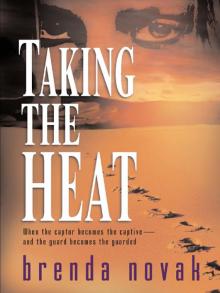- Home
- Brenda Novak
Face Off Page 3
Face Off Read online
Page 3
“Oh God,” Sierra murmured, and scrambled away, nearly tripping as she burst through the hole she’d chopped in the door. They shouldn’t have come to Alaska, not in October, she told herself as she hurried back to the cabin and locked the door behind her. They’d been over-eager, determined to squeeze in the trip, despite the early onset of winter. Now her brother and his friends were out in the wilderness in the worst storm she’d ever seen and she was alone in a cabin where a woman had recently been murdered, her corpse dumped in the shed, and Sierra couldn’t run for help, couldn’t call for help, either. She couldn’t even leave or she might die of exposure—not that she’d go anywhere without her brother.
“What am I going to do?” she whispered aloud as she listened for the Ford Expedition the men had taken. Leland, Peter and Ted would be back soon. They needed shelter, wouldn’t be able to stay out in this weather for long. When they arrived, she’d run out, get in the truck with them and insist they leave immediately. She didn’t want to be here another second; she’d go crazy if they didn’t come soon.
But one minute after another ticked away, and she didn’t hear anything except the eerie rattle of the windows and the pounding of what sounded like torrential rain on the roof.
Calm down. Keep it together, Sierra. You have to be patient. There’s nothing you can do except wait—and get warm.
She added a log to the stove and sat in front of it, staring at the glowing embers as she rocked back and forth, back and forth. She was trying to get over the shock, but it didn’t matter how much heat the stove threw off; she remained cold as ice. Even when she finally recovered enough to pack—for her and all the people she was with—she couldn’t seem to get warm. And every time she peered out the window, the storm looked worse.
She hoped the guys had at least made it to the truck. Were they sheltering inside it, waiting for the onslaught to let up before trying to drive out?
If they didn’t get going soon, they could end up trapped. She’d never seen so much wind and snow. What with the narrow dirt roads they had to travel to reach the backwoods, it could already be too late.
Maybe that was why they hadn’t returned. They couldn’t.
Leland and his friends had two ATVs with them. Even if the Expedition got stuck, they’d get out. They had to come back, because if they didn’t …
She couldn’t let herself think about what might happen if they didn’t. She’d have to get help somehow. Their lives could depend on it. And she had to tell the authorities about the body in the shed. That woman did not die of natural causes. The ligatures and the injuries—terrible injuries—indicated murder. That meant there was a killer on the loose, and a brutal killer at that. What had been done to the woman wasn’t what any normal person would do, even in a rage.
Just when Sierra thought her nerves couldn’t take any more waiting, not with that battered, frozen body so close, she spotted a glimmer of light in the darkness.
What was that? Headlights? Could Leland, Peter and Ted finally be back?
Pulse racing, she pressed her palms to the glass and stared into the inky blackness.
What she’d seen was gone, just that fast. And she couldn’t hear a motor. Had she imagined it? Could that glimmer have been a flash of lightning instead? The sun penetrating the storm clouds for a few seconds?
“Come on, come on.” She stood, transfixed, for probably fifteen minutes, hoping and praying that her long vigil would be over at last. But she never did see any more light, couldn’t see anything at all.
Why not? Leland and his friends should be tramping through the front door by now.
It wasn’t until she heard the doorknob rattle at the back of the cabin that she realized she’d been right about someone being outside. Only a human could make that sound, not the wind. But Leland and the others wouldn’t come through the back. There’d be no reason for them to do that.
So who was trying to get in?
* * *
“What are you doing?”
Evelyn tilted her head to the side as Amarok came up from behind and bent to kiss her neck. He’d been on the phone with Phil Robbins, a middle-aged local who assisted him in the capacity of Public Safety Officer during the summer. In the off-season, with most of the hunters and fishermen gone for the winter, Phil manned a plow and helped with snow removal, so Amarok had been trying to coordinate with him to make sure the streets were cleared well enough that everyone could get home from work. While Amarok talked in the kitchen, she’d picked up a psychology book and propped her feet up on the coffee table. Makita, Amarok’s Alaskan malamute, sat nearby, hoping for more of the scratches she’d been giving him periodically, and Sigmund, her cat, played with the drapes of the big window that showed nothing but black outside. It wasn’t like her to take a day off. Although she’d done quite a bit of work from home after she got back from her doctor’s appointment, she’d never made it to the prison. She hadn’t cared to fight the weather. And she was happy to stay in for the night now that Amarok was back. “Just flipping through a book I’ve been meaning to reread,” she told him.
He turned her wrist to see the cover. “Mask of Sanity?”
“Yeah. It’s an older title, but I like comparing what I’ve found through my own studies with what’s been published in the past, and some of the pioneers in my field were right about a lot of things.”
“Like this Hervey M. Cleckley? He was a pioneer?”
“Yes. Bob Hare—you’ve heard me talk about him, since he’s the one who developed the psychopathy test we use, the PCL-R—based some of his findings on Cleckley’s work.”
He indicated the other book—Martha Stout’s The Sociopath Next Door—waiting on the table next to her feet. “Looks like you’re planning to be up late.”
“Not really. I’m just skimming.” She and the rest of the mental health team at Hanover House—which, besides her, consisted of five psychologists and one neurologist—kept a selection of the most popular titles on psychopathy in the conference room, where they met once a week to recap and plan. Evelyn wasn’t sure why she’d decided to bring a couple of the books home with her last night. “To be honest, I’m almost becoming more interested in ambulatory psychopaths than—”
“Ambulatory?”
“Garden-variety psychopaths, the subclinical ones who purposely submarine a friend, lie without compunction, take advantage of others, that sort of thing. Not the kind who rape and kill.”
He came around and nudged Makita to move a bit so that he could sit next to her. “I like where this is going. These other psychopaths have to be safer. But it’s the criminal ones you’re trying to stop. That’s why you started Hanover House. So why the interest?”
“I find it surprising that there are so many people without a conscience, and that so many of the rest of us still believe everyone else is basically empathetic, like we are. That allows us to be blindsided when we run into either kind of psychopath, and we’re bound to run into one eventually. Our society is facing a pandemic. The rate of incidence for anorexia is lower than that of psychopathy!”
“Which stands at four percent.”
“According to our best estimates. Wow, you do listen when I talk about my work.”
He grinned at her. “I was thinking it’s a damn good thing not all those people are the kind of psychopaths who kill.”
“Even the subclinical ones are harmful. They empty bank accounts. Break hearts. Lie, steal, cheat and use. They can make life difficult for anyone they come into contact with, and do it without a single regret.” She put her feet down so she could lean forward. “Here’s a shocking statistic. The rate of psychopathy is one hundred times greater than the incidence of colon cancer in the United States. We hear about colon cancer all the time, and yet the general populace knows very little about psychopaths, except for what they associate with ‘serial killer,’ and that isn’t the whole picture.”
“That’s why, in addition to all the murderers you’ve had transferred to Hanove
r House, you’ve got a couple hundred psychopaths there who haven’t killed anyone.”
“Yes. Alan Harrington says—”
He raised a hand in the classic stop gesture. “Who’s Alan Harrington?”
“He wrote a book called Psychopaths. I don’t have it with me tonight, but I’ve read it. Although his views have been highly criticized, his claims are food for thought. He believes psychopaths are being produced by the ‘evolutionary pressures of modern life.’”
Amarok shook his head. “I don’t buy that.”
He didn’t buy a lot of things when it came to psychology, and he didn’t hesitate to let her know it.
“There may be a whole bunch of these monsters out there, but humanity in general seems to be getting gentler and kinder,” he said. “They used to hang people in public, for crying out loud—to the cheers of a large crowd that included children. They also dreamed up new ways to torture ‘heretics’ for their religious beliefs or lack thereof.”
“In some places they still torture unbelievers,” she said dryly.
“I’m talking systematic torture, which they carried out for five hundred years. During the Inquisition, they tried to police people’s thoughts. Think of the progress we’ve made with the rights of women, minorities, even animals.”
“Maybe most of the population is evolving, developing a more refined conscience, but some people are losing theirs entirely.”
“You’ve experienced that.” He toyed with a strand of her hair. “What I don’t understand is why some psychopaths murder and maim and others don’t. You’ve told me plenty of psychopaths are doctors, policemen, lawyers, businessmen and politicians. How is it that so many of them function normally?”
They’d talked about this before. But it remained a subject they rehashed occasionally, since there wasn’t any “absolute” answer. “As far as we can determine, it’s simply because everyone’s different. People have different joys, different goals, different tastes, different inhibitors, different talents. The same holds true for psychopaths. One might delight in killing. The next might need to be top dog at his firm and will do anything, step on anyone, to get there. For the next one, sponging off the people around him makes him happy enough. That’s why it’s so hard to come to any kind of consensus on how to detect psychopaths, how to treat them—even how to define them. There are so many variables.”
Amarok got up, went to the kitchen and uncorked some wine. “Would you like some?” he asked, holding up the bottle.
“Sure.”
She watched as he poured two glasses and carried them to the couch.
“You’ve met some of the inmates at Hanover House,” she said as he handed her one. “Lyman Bishop was very different from Anthony Garza, wouldn’t you say?”
He took a drink of wine. “I would. And from what you’ve told me, Jasper is different still.”
She couldn’t help grimacing. “Jasper’s the most frightening psychopath I’ve ever met.”
“He’s what’s called a ‘charismatic psychopath.’” He nudged her. “See? I have been listening.”
She tapped the book she’d been reading. “Cleckley uses words like ‘likeable,’ ‘charming,’ ‘intelligent,’ ‘alert’ and ‘impressive’ when he’s describing some of the psychopaths he studied.”
“I’ve heard you use some of those words.”
“Yes. They fit Jasper to a T. He was the most popular boy in school, could charm anyone. I felt so lucky he chose me.” A wave of resentment passed through her as she remembered the moment she’d found her three girlfriends, murdered, in the little shack she and Jasper had used when they wanted to be alone. He’d lured her friends there and killed them for telling her they’d caught him flirting with another girl—a terrible punishment for such a minor offense, especially because he probably had been flirting.
Amarok held her hand. He didn’t even have to say anything. He was there for her, comforting her, helping her forget and move on. That had to be why she could talk about her past more easily these days. Still, she doubted even the scars she carried on the inside—not to mention the one on her neck—would ever entirely go away.
“I had no clue what he was really like until he dropped the mask,” she said as the worst of her memories, the ones she generally tried to repress, darted across the stage of her mind. “Psychopaths are master manipulators.”
“Look at you, talking about this with such objectivity.”
She chuckled. “I’m healing in so many ways.” She put her drink on the coffee table and took his face between her hands. “And a lot of it is because of you.” She pressed her lips to his and knew that kiss could turn into much more. She heard him sigh in satisfaction, felt his arms go around her and draw her close.
Then the phone rang.
She broke away. “Phil?”
“I don’t know. Ignore it,” he said, and pulled her back for another kiss.
As soon as the ringing stopped, it started up again. Someone wanted to reach him—or her.
Reluctantly, he lifted his head. “Hold that thought,” he said, and walked over, but once he answered, the way his forehead creased suggested it wasn’t good news. “Right now?… What’d you say?… When?… All right, I’ll be there in a sec.”
“What is it?” she asked as he hung up.
“I have to go.”
“Why?”
“There are some hunters at my trooper post. One claims his sister has gone missing.”
“Gone missing from where?”
“A cabin in the mountains. No idea which one. I don’t have many details. All Phil could tell me is that he stopped to get something hot to drink before plowing Main Street again and ran into three guys as he came out. They were frantic, especially one called Leland. He said they were hunting when the storm hit, made it back to their SUV but got stuck in the snow. By the time they dug out the tires and finally reached where they were staying, his sister, who was supposed to be waiting for them, was nowhere to be found.”
Evelyn sat up straight. “Where could she have gone?”
“That’s what I have to find out,” he said as he shrugged on his heavy coat.
Evelyn stood up and came around the couch to meet him at the door. “You don’t think she went out looking for them and got lost.…”
“In a storm like this? I hope not. If she did, it could already be too late.”
* * *
Amarok managed to convince two of the three hunters to get a room at The Shady Lady rather than risk the trek back to the cabin, but Leland Yerbowitz refused to be left behind. He was determined to help look for his sister, even though Amarok had tried to tell him to stay with his friends. Amarok preferred not to take a cheechako—someone who wasn’t from Alaska and didn’t know how to live there—out into this weather. He shouldn’t be out in it himself. With night coming on and the storm getting worse, he was taking a risk. But he had to do what he could to find Leland’s sister before the temperature dropped any further.
“What’s your sister like?” he asked as they drove. He was trying to distract Leland from his worry, but he also wanted to learn if Sierra was knowledgeable about the outdoors, if she’d done much traveling or exploring or if she was the type who might wander off on her own because of some emotional problem.
Leland stared out at the torrent of snow that made it difficult to see through the windshield. “You know this road like the back of your hand, right?” he said instead of answering.
Amarok didn’t generally have much reason to visit individual hunting cabins. He checked on them occasionally, if the owners requested it, but typically only during the summer. Most were empty throughout the colder months. “I’m somewhat familiar.”
“Somewhat” didn’t seem to offer the reassurance Leland was hoping for. He gripped his seat belt. “How are you going to keep from going over the side?”
Amarok had put chains on all four tires, even though he had four-wheel drive and a shovel on the front of his truck. �
��I’m taking it slow.”
From Leland’s expression, Amarok wasn’t taking it slow enough, but Sierra’s brother obviously felt the same pressure Amarok did to return to the cabin as quickly as possible, so he clamped his mouth shut and let Amarok drive.
“Can you tell me a little about your sister?” Amarok prompted, trying again.
“What about her?” he asked, his words clipped. “She’s twenty-eight and due to be married soon. We need to find her. I can’t … I can’t even imagine how I’ll feel if something’s happened to her. My mother, my father, our pregnant sister. What’ll I tell them? And her fiancé? I’ll feel responsible for this. I’m the one who wanted to go hunting. She just wanted to do the touristy stuff.”
“We’ll find her,” Amarok said.
“I can’t imagine where she is.”
“Why didn’t her fiancé join you?”
“Couldn’t. He’s a long-haul trucker and had a big delivery.”
“I see. Is she familiar with Alaska?”
No response. It was easy to tell that Leland could only concentrate on finding her, didn’t want to talk or do anything else until that happened.
“Leland?”
“Not at all,” he replied. “This is our first visit, something we’ve been looking forward to for months.”
That wasn’t the answer Amarok had been hoping to hear. Not only was Sierra completely new to the area, she was also young and inexperienced enough that she might feel capable of more than she could accomplish in conditions like these. “Is she prone to wandering off on her own?”
“No. That’s the thing. She has a good head on her shoulders. She’s the one who was worried about coming to Alaska so late in the fall, but”—he shook his head as if he was too anxious to go into any great detail—“we had certain constraints we were working under with our hunting permits.”

 Falling For You
Falling For You A California Christmas
A California Christmas When I Found You
When I Found You Sanctuary
Sanctuary Home for the Holidays (Silver Springs)
Home for the Holidays (Silver Springs) One Perfect Summer
One Perfect Summer Christmas in Silver Springs
Christmas in Silver Springs Before We Were Strangers
Before We Were Strangers Coulda Been a Cowboy
Coulda Been a Cowboy Blind Spot
Blind Spot That One Night
That One Night The Perfect Murder
The Perfect Murder Falling For You (Dundee Idaho)
Falling For You (Dundee Idaho) In Close
In Close Home for the Holidays
Home for the Holidays A Dundee Christmas
A Dundee Christmas The Perfect Couple
The Perfect Couple On a Snowy Christmas
On a Snowy Christmas Her Darkest Nightmare
Her Darkest Nightmare When We Touch
When We Touch A Winter Wedding (Whiskey Creek)
A Winter Wedding (Whiskey Creek) The Perfect Liar
The Perfect Liar Dead Silence
Dead Silence Baby Business
Baby Business Shooting the Moon
Shooting the Moon A Home of Her Own
A Home of Her Own Taking the Heat
Taking the Heat Of Noble Birth
Of Noble Birth Every Waking Moment
Every Waking Moment Face Off
Face Off Expectations
Expectations Hello Again
Hello Again When Snow Falls
When Snow Falls Come Home to Me
Come Home to Me Be Mine at Christmas
Be Mine at Christmas The Secrets She Kept
The Secrets She Kept In Seconds
In Seconds No One but You--A Novel
No One but You--A Novel Dear Maggie
Dear Maggie Hanover House: Kickoff to the Hanover House Chronicles
Hanover House: Kickoff to the Hanover House Chronicles When Summer Comes
When Summer Comes Discovering You
Discovering You Inside b-1
Inside b-1 Body Heat
Body Heat Sweet Dreams Boxed Set
Sweet Dreams Boxed Set A Family of Her Own
A Family of Her Own Stop Me
Stop Me Inside
Inside The Heart of Christmas
The Heart of Christmas In Seconds b-2
In Seconds b-2 Through the Smoke
Through the Smoke The Other Woman
The Other Woman We Saw Mommy Kissing Santa Claus
We Saw Mommy Kissing Santa Claus 05 Take Me Home for Christmas
05 Take Me Home for Christmas Killer Heat
Killer Heat This Heart of Mine
This Heart of Mine Until You Loved Me--A Novel
Until You Loved Me--A Novel Cold Feet
Cold Feet Snow Baby
Snow Baby Dead Giveaway
Dead Giveaway Face Off (Dr. Evelyn Talbot Novels)
Face Off (Dr. Evelyn Talbot Novels) Just Like the Ones We Used to Know
Just Like the Ones We Used to Know A Baby of Her Own
A Baby of Her Own Take Me Home for Christmas wc-5
Take Me Home for Christmas wc-5 Finding Our Forever
Finding Our Forever Historical Romance Boxed Set
Historical Romance Boxed Set Right Where We Belong
Right Where We Belong Big Girls Don't Cry
Big Girls Don't Cry